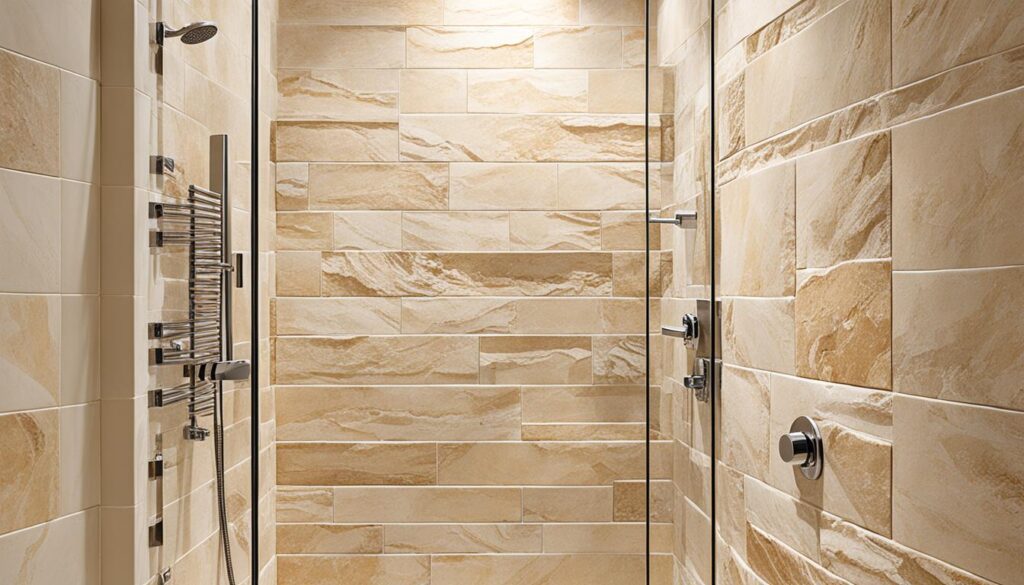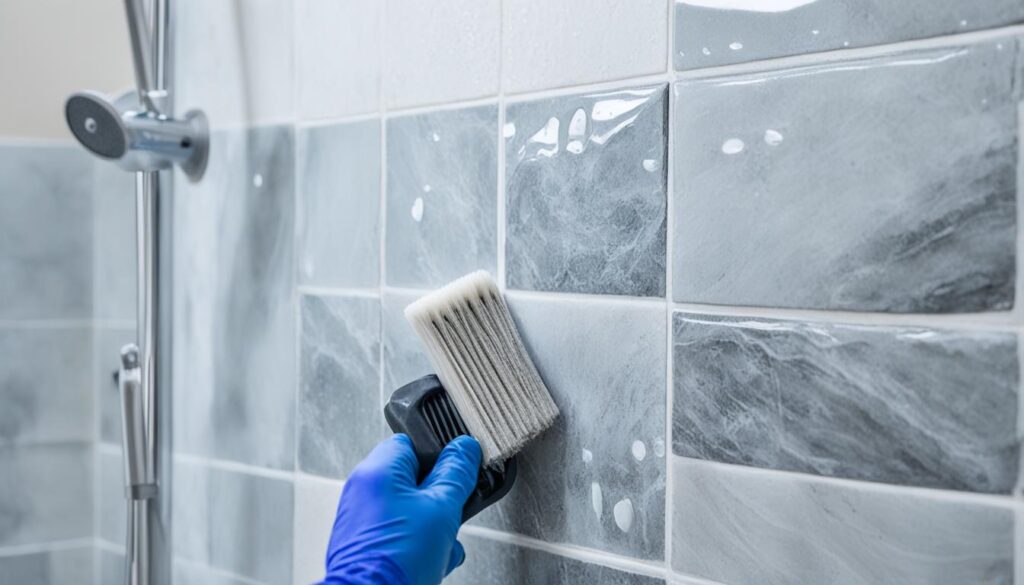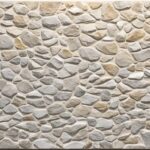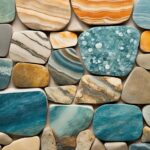Incorporating Natural Stone in Shower Design Safely
Transforming a bathroom into a spa-like retreat starts with the right materials, and installing natural stone in a shower elevates both luxury and comfort. While the natural allure of stone introduces an artistic statement, the practicality of natural stone shower tiles remains unmatched. To maintain the grandeur of these exquisite surfaces, sealing natural stone shower areas is essential. It’s not just about aesthetics; diligent maintenance ensures longevity and preserves the lavish appeal against the humidity and moisture commonly found in bathrooms.
However, natural stone’s splendor comes with the need for informed care. Awareness of specific maintenance practices is vital, such as ensuring efficient water drainage and conducting regular sealant applications. This level of dedication affirms that your natural stone shower not only stands out in elegance but also stands up to the practical demands of daily use.
Key Takeaways
- Essentiality of annual sealing to maintain water repellence and durability of natural stone in showers.
- The importance of choosing the right stone and finish for minimizing moisture retention and promoting swift drying.
- Implementing proper drainage and ventilation to prevent mold and mildew formation.
- Regular cleaning and the use of a penetrating sealer to protect natural stone’s beauty over time.
- Maintenance is the key to ensuring natural stone retains its luxurious appeal in shower designs.
The Allure of Natural Stone in Bathroom Elegance
Natural stone shower walls are not just a design choice—they transform your bathroom into a timeless sanctuary that echoes the opulence of the finest hotels. With their diverse range of textures and colors, these elegant features become the cornerstone of luxury in modern bathrooms. But perhaps more important than their initial impact is their durability and the sense of ageless beauty they imbue in the space.
Natural Stone’s Timeless Luxury
Imagine stepping into a shower encased in the natural splendor of marble or the distinguished character of granite. These natural stone options are not merely baths; they’re statement pieces, crafted by nature and honed by expert artisans, that anchor your bathroom’s aesthetic in the realm of luxury. The intrinsic patterns of veining, the depth of their polish, and the substantial feel of stone all contribute to a shower experience that is both elevating and grounding.
Maintaining Stone’s Beauty in Damp Conditions
Maintaining the natural stone shower does require dedication to preserve its splendor. A critical aspect of this is ensuring the polished surfaces are well-sealed, making them water-repellent and more manageable to keep clean. Beyond daily care, it’s vital to undertake preventative measures such as sealing the surfaces annually, choosing quality grout and caulk with mildew-resistant properties, and ensuring that all nooks have adequate drainage to fend off mold and mildew growth.
- Diligently sealing the stone regularly to extend its resistance to water and wear.
- Opting for polished finishes to hasten drying and minimize water retention on stone surfaces.
- Incorporating mildewcide into grout and caulk selections to prevent fungal growth.
- Employing honed and textured finishes, which should be accompanied by excellent drainage systems and frequent drying post-use.
Knowing how to clean natural stone shower surfaces correctly is just as important. Using gentle, pH-neutral cleaning agents can help in maintaining the integrity of the sealant and the stone’s natural finish. This approach, along with meticulous care, ensures the longevity and continued elegance of the natural stone within the steamy shower environment.
Can Natural Stone Be Used In A Shower
When it comes to designing a shower, homeowners and interior designers often wonder, “Can Natural Stone Be Used In A Shower?” The answer is a resounding yes. Choices like slate, marble, and granite not only offer a panorama of natural beauty but also boast durability and resilience that make them ideal for the warm, moist environment of a shower. These stones bring the best of nature into one of the most intimate spaces in a home: the bathroom. Let’s examine why they are considered the best natural stone for shower installations.

For those considering natural stone, it’s essential to understand the interplay between stone choice and maintenance. The sleek and smooth surfaces of certain stones can provide a refined look while superlative in terms of slip resistance and easy cleaning. Durable stones like granite, with their textured finishes, offer an earthy grip that can reduce the chances of slipping – an important safety feature for shower floors.
Here’s a quick guide to help you understand how different natural stones stack up when used in shower environments:
| Stone Type | Texture | Durability | Maintenance |
|---|---|---|---|
| Marble | Smooth/Polished | High (with regular sealing) | Annual sealing; pH-neutral cleaners |
| Granite | Textured/Flamed | Very High | Annual sealing; mildew-resistant grout |
| Slate | Cleft/Natural | High | Sealing as recommended; gentle cleaning |
To ensure that natural stone maintain its excellence in appearance and performance in a shower setting, it’s critical to commit to proper care. This includes regular and annual resealing to protect against moisture ingress. Additionally, steering clear of harsh chemical cleaners helps in preserving the stone’s natural patina. The combination of correct stone selection, consistent maintenance, and the employment of appropriate sealants enables you to enjoy the beauty of natural stone in your shower with peace of mind.
Alongside maintenance, understanding the unique characteristics of various stone types can guide you in making the best choices for your shower design. With careful consideration to their innate properties, these stones can provide not just an elegant bathroom experience, but also a robust surface that withstands the test of time and usage. Customizing the bathroom with the perfect natural stone selection will bring the sensation of a personal retreat, resonating style and relaxation within the comfort of your home.
Choosing the Right Natural Stone for Shower Walls and Floors
When designing a shower, selecting the right natural stone shower tiles is critical. Whether they grace the walls or lay underfoot, these stones must offer both beauty and functionality. Natural stone lends a handcrafted quality to any bathroom, and understanding the individual qualities of different stones is pivotal in creating a safe and durable shower environment.
There’s a myriad of options available, and homeowners can enhance the sophistication of their bathrooms with choices that best suit their taste and lifestyle. To balance practicality with luxury, it’s essential to consider the texture, durability, and ongoing maintenance that each stone requires.
Durability and Slip Resistance Considerations
The choice between various natural stones should not be taken lightly, especially in a wet environment such as a shower. Durability and slip resistance are of paramount importance. For the shower floors, the best natural stone for shower use will have a textured finish to prevent slipping, while the walls can showcase the sleek elegance of a smooth, polished stone.
Stone Varieties: Slate, Marble, and Granite
Slate offers a natural and rustic appeal with excellent slip resistance, making it a superb choice for shower floors. Marble, synonymous with luxury, is often selected for shower walls due to its polished look and timeless beauty. Granite, known for its toughness, can serve well both on shower floors for its texture and walls for its diverse patterns.
To assist in your decision-making, here’s a comprehensive comparison table:
| Stone Type | Preferred Application | Texture | Maintenance Tips |
|---|---|---|---|
| Slate | Floors | Cleft/Natural | Seal regularly; clean with pH-neutral products |
| Marble | Walls | Smooth/Polished | Use mildew-resistant grout; dry surfaces to prevent water spots |
| Granite | Walls & Floors | Polished/Flamed | Annual sealing; aggressive cleaning avoided |
Regardless of the type, it is recommended to treat all natural stone shower walls and floors with high-quality sealers to safeguard against moisture and everyday wear. This ensures that the stone’s magnificence remains intact, allowing you to relish the opulence they add to your daily routines.
Ensuring Safety: The Importance of Sealing and Resealing
Sealing natural stone shower surfaces is an integral part of creating a bathroom that’s not only beautiful but also functional and safe. Investing in the right type of sealing product can mean the difference between a shower that sustains its beauty over time and one that succumbs to the dampness and rigor of daily use.
The Role of Penetrating Sealers
For the safety and maintenance of natural stone showers, penetrating sealers are a key defense against the invasion of water and bacteria. Unlike topical sealers that form a layer on the surface, penetrating sealers delve into the stone, filling its pores and solidifying a barrier from within. This fortress below the surface lends the stone its admirable resilience against moisture, stains, and erosion, preserving its integrity and slip resistance.

How Often to Reseal Natural Stone in Showers
How often to reseal natural stone in showers is a common question posed by homeowners seeking to maintain their luxe shower spaces. While the standard recommendation is to reapply sealant annually, the frequency may indeed vary. Factors such as the porosity of the stone, the level of shower use, and the quality of the previous sealant job all influence this timeline. Keeping a regular check on the stone’s condition and water repellency will indicate when it’s time to reseal, ensuring ongoing safety and elegance.
Maintaining a safe and stunning natural stone shower is a commitment to both regular upkeep and proactive measures. By choosing penetrating sealers and adhering to a consistent resealing schedule, homeowners can ensure that their natural stone showers continue to offer both the visual allure and the durability they fell in love with.
Optimizing Shower Design with Stone Slabs and Tiles
Embarking on a bathroom renovation or new build requires thoughtful selection when installing natural stone in a shower. Striking the perfect balance between form, function, and maintenance is key for a shower that is as user-friendly as it is beautiful. A truly optimal design involves strategic choices in both stone slabs and tiles, that not only display the unique characteristics of the material but also guarantee ease of upkeep and timeless elegance.
Slab Selection for Shower Walls
Choosing the right stone slab for shower walls sets the stage for a luxurious bathing experience. A seamless, expansive stone surface can create a stunning focal point. While marble is often favored for its classic, veined appearance, granite provides a more modern look with its granular and speckled patterns. Both are excellent choices, yet it’s critical to consult with your contractor to ensure that the stone complements the functional needs and style aspirations of your space. Remember, maintaining natural stone shower surfaces involves more than just aesthetics; it requires dedication to preservation and care.
Tile Size and Grout Considerations for Easy Maintenance
When it comes to natural stone shower tiles, size does matter. Larger tiles reduce the amount of grout needed, which minimizes the potential for mold and mildew buildup and simplifies cleaning. Ensuring that grout lines are properly sealed and using grout with mildewcide will further ease maintenance efforts. It’s crucial to support the beauty of the stone with well-thought-out features that are not only visually pleasing but also promote a clean and safe environment.
| Feature | Advantage | Maintenance Benefit |
|---|---|---|
| Large Stone Tiles | Continuity in design, fewer grout lines | Less accumulation of moisture and mildew |
| Mildewcide-infused Grout | Active resistance to mold | Reduced cleaning and repair frequency |
| Efficient Drainage | Prevents water stagnation | Limits potential for water damage and mildew growth |
| Good Ventilation | Encourages quick drying | Sustains a dry and mildew-resistant shower environment |
The longevity and freshness of your stone surfaces rely on these considerations. By aligning with these guidelines, your natural stone-rich shower area will remain a testament to both your exquisite taste and your commitment to preserving its grandeur.
Mold & Mildew Resistance in Natural Stone Showers
Maintaining natural stone shower spaces involves more than just routine cleaning; it necessitates a strategic approach to mold and mildew resistance. Homeowners and designers prize natural stone for its elegance and durability, yet its integrity can be compromised by the persistent threat of moisture and biological growth. Recognizing the right techniques and materials for mold prevention is essential in conserving the beauty and longevity of these shower surfaces.
Effective Drainage Systems
Water stagnation is the foremost enemy in the fight against mold and mildew in natural stone showers. Implementing effective drainage systems ensures that water flows freely, leaving no breeding ground for these undesired guests. Each element of the shower, from the floor to the intricacies of niches and shelves, must be designed for swift water evacuation. Even the most meticulously maintained stone will succumb to moisture without proper drainage, undermining the efforts invested in how to clean a natural stone shower.
Choosing Caulk and Grout with Mildewcide
The battleground for mold prevention is often in the tighter joins and finishes of a shower space. Selecting the right grout and caulk represents an active form of defense. Products fortified with mildewcide can dramatically decrease the likelihood of mold and mildew taking root, creating a critical preventive barrier. This preemptive strike, when combined with attentive inspection and care, can keep the natural stone pristine and inhospitable to unwanted growth.
Complementing the aforementioned strategies, bathrooms should be equipped with appropriate ventilation. Modern fan systems and central air vents can aid significantly in expelling humidity post-shower, further endorsing a mold-resistant atmosphere. By acknowledging the importance of these measures, homeowners can take pleasure in the enduring beauty and resilience of natural stone showers, free from the concern of mold and mildew.
Ensuring that natural stone retains its beauty within the moist environment of a bathroom comes down to a concerted effort in prevention and maintenance. By incorporating these strategies into the design and daily care of a stone shower, the fight against mold and mildew can indeed be won, protecting your investment and preserving the splendor of natural stone for years to come.
Conclusion
As we’ve explored the intricacies of installing natural stone in a shower, the importance of fusing aesthetics with practicality is paramount. Natural stone shower tiles not only add to the visual grandeur of a bathroom but also call for an understanding of their upkeep. This luxurious material, celebrated for being the best natural stone for shower environments, holds a beauty that’s poised to transcend time—if maintained correctly. It behooves homeowners to employ a meticulous regimen of care, embracing the responsibility that comes with selecting such an exquisite, timeless material.
Combining Aesthetics with Practicality
In the realm of bathroom design, the choice of natural stone reflects a commitment to creating a space that’s both opulent and enduring. The practicalities of daily use and natural stone’s susceptibility to the elements dictate a diligent approach to maintenance. From the sealing and resealing processes to the vigilant eye for drainage and ventilation, the functional needs are just as critical as the aesthetic desires. Ensuring that these aspects harmonize can lead to a shower experience that’s as rejuvenating for the soul as it is safe and steadfast.
Consulting Experts for Your Stone Shower Project
Embarking on a project involving natural stone necessitates navigating a terrain that spans beauty, functionality, and sustainability. Seeking the expertise of seasoned stone professionals can be invaluable. These experts are equipped with the knowledge to facilitate the appropriate selection of stone, advise on the best installation practices, and guide towards the ideal maintenance routine. Engaging with professionals ensures the creation of a natural stone shower that is not merely an emblem of luxury, but a lasting haven of tranquility in your home.



